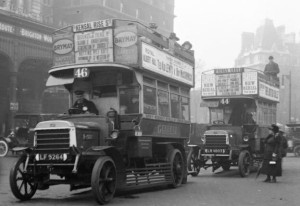1st November 1914
The Dorsets awoke on a fine Sunday morning, perhaps expecting a nice leisurely breakfast and a stroll around Strazeele. However, at 7.50am they were greeted by a II Corps Staff Officer, Colonel Shoubridge, who announced that they were to be taken away by buses to the front. How dismayed they must have been. Their promised seven days rest vanished in an instant.
I think that II Corps knew it would be a tough ask so they decided to apply a bit of motivational management. Colonel Shoubridge himself was an ex-1st Dorsets man. As the men climbed wearily into the buses Sir Horace Smith-Dorrien, II Corps’ commander, arrived and spoke to them, praising their fine fighting at Pont Fixe. The phrase forms the title of a self-published book I’m still trying to track down by Captain A.L. Ransome, “The fine fighting of the Dorsets”, portions of which embellish the official History of The Dorsetshire Regiment 1914-1919.
I have reasons to doubt his sincerity. Smith-Dorrien had actually been very critical of the 15th and 13th Brigades’ performance at Pont Fixe as I’ve explored in a previous post. He also claimed that the Dorsets and Cheshires “did not put up a resolute resistance” on the 22nd October at Violaines.
But these were desperate times and every spare unit was needed. The rumble of guns heard by the Dorsets the previous evening had been the sound of the Germans breaking the British line at Gheluvelt, east of Ypres in Belgium. Only a desperate charge by the 2nd Bn Worcestershire regiment on the 31st October had saved the situation. It remained critical time for the Allies and the British and French poured their tattered troops in to plug the gaps. The Dorsets were bound for Ploegsteert, where they were being attached to the 4th Division, who were having a very hard time of it.
And so the Dorsets grudgingly clambered aboard buses. Buses straight from the streets of London., manned by volunteers, painted red and white and still plastered with adverts for Evening News and Wright’s Soap.

The London B-Type Motor Omnibus could hold 24 men, so between 30 and 40 buses would have trundled over the border into Belgium. It must have been a bizarre couple of hours for Frank, as if his old London life had suddenly emerged out of the past.
The journey would have been pleasant enough for the Dorsets as they enjoyed clear blue skies, very similar to today’s weather 100 years later. This wasn’t to last. As they approached Lindenhoek they could actually see heavy shelling to the north east at Wytschaete. Messines to the east had fallen and the Germans were pushing forward into Ploegsteert wood three miles east of Neuve Eglise.
At 3pm the Dorsets went into billets at Neuve Eglise. At 5pm B Company was sent out as an outpost on the Wulverghem-Neuve Eglise Road. C and D Companies entrenched nearby. Frank and the rest of A Company remained in billets in Neuve Eglise. An hour later they were joined by the rest of the Battalion, leaving just one platoon of B Company covering the road.
